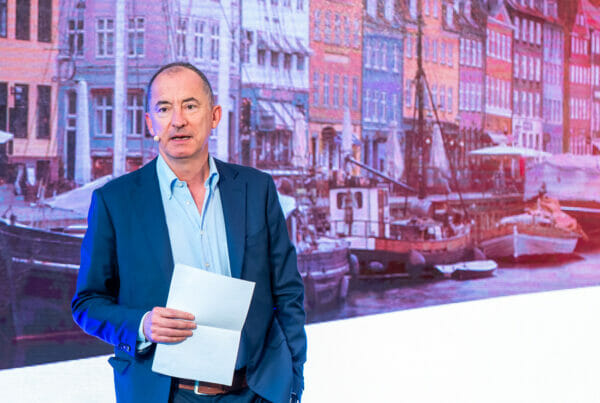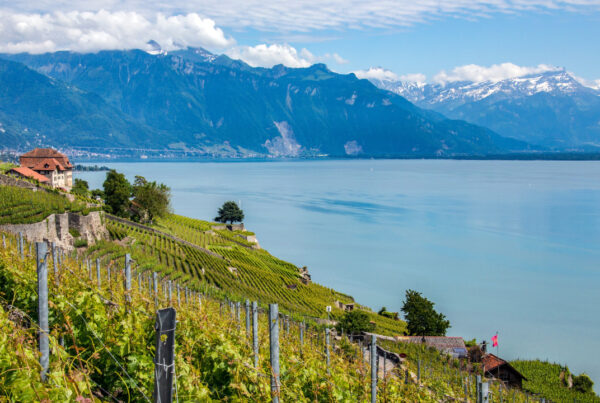Looking to upskill in business and sustainability? We spoke with SUMAS alumna, Danielle Boiston, about taking a Certificate of Advanced Studies (CAS) at SUMAS. Through this short program, she was able to enhance her knowledge of Sustainable Hospitality Management and make meaningful impact professionally and personally.
1. After 16 years in international events, why return to school?
As Gandhi said, “Changing the world, starts by changing yourself.”
It was seven years ago, whilst organizing a conference in South Africa, that I really became conscious of the carbon footprint of the events industry. Both the convention center and transport provider were ahead of the game in terms of sustainability; their forward thinking made me realize that in addition to what makes an event happen, I wanted to make a difference to how we organized our events. I was inspired to start managing the event logistics with purpose, focusing not only on reducing negative environmental or social impact, but also actively giving back to local communities who host our events. Those initial collaborations with a few likeminded people led me to initiate a greener event concept which included reviewing transport, food and beverage and waste management, as well as offsetting travel through investing in local projects. This approach quickly raised awareness amongst participants, staff and suppliers and also gave great job satisfaction, adding meaningful value to my career.

Danielle Boiston, CAS in Sustainable Hospitality Management, Class of 2021
When the COVID pandemic hit and the physical events I was organizing were put on hold, I took the time to reflect on what I really wanted to do. Although I had experience in prestigious events, I knew that a qualification to build upon my passion for sustainability would create a unique combination of skills to start a new chapter in my career.
This time seemed like a great opportunity to focus on my personal development and consequently, I took a year out to study, with SUMAS being my institution of choice.
2. Why is developing skills in sustainability management so important?
Though it seems that we are more and more aware of what needs to be done, we now need to change gear and start delivering action. The World Economic Forum Risks Report 2022 puts “Climate Action Failure” top out of thirty-seven global risks that we face in the next two to ten years. Identified by 12,000 leaders in 124 countries as the biggest concern for the future, along with extreme weather events and biodiversity loss, it is clear that the planet simply cannot wait.
SUMAS therefore has an important, in fact essential, role to equip students with the skills needed to meet the growing demand for sustainability-focused jobs. There are many directions and destinations to pursue. Just focusing on the hotel sector alone, which accounts for 1% of GHG, and knowing that the hospitality industry needs to reduce its carbon emissions by 66% per room by 2030 and 90% per room by 2050 (Rajesh, March 2020), it is critical that people have the skills to accomplish these intended results.
3. How has SUMAS provided opportunities to differentiate yourself?
I was attracted by the fact that SUMAS is the first business school of its kind, it offers courses in English and in particular, allows you to enroll in different industry specializations and programs. The Certificate of Advanced Studies (CAS) in Sustainable Hospitality Management was a natural progression for me coming from the events sector where hospitality is key. However, I didn’t want just theory; I was drawn by the opportunities at SUMAS to learn from real case studies and work on actual projects to design practical solutions for the travel and tourism industry. My highlight was the project experience to integrate and communicate sustainability practices into a 5-star hotel in Geneva.

4. Tell us what made the project experience special?
It was a three-way partnership between SUMAS, the Mandarin Oriental hotel in Geneva and us as students, whose mission was to work together as a team of sustainability consultants. For me it was a success for three reasons:
- The hands-on approach went beyond desk research: it included site visits, conducting a staff survey, and interviews with hotel management. We had real “behind the scenes” access to analyze the data and current sustainability practices.
- It was a co-learning process with ongoing feedback from the teacher and collaboration with real players from the hospitality sector. Through group work and sharing ideas, we also learnt from each other and could seize leadership opportunities at different stages in the project.
- Knowing that the jointly-compiled final report, which identified and prioritized ten sustainability strategies, would have real tangible impact was both motivating for the students and rewarding for all the project stakeholders.
5. Which format of study would you recommend?
I chose a hybrid program at SUMAS, attending classes 2 days each week on the campus in Gland, Switzerland, as well as an additional course online. The key benefits for me were:
- Online – possibility to interact with students from all over the world
- Online – flexibility to study in my own time, and at my own pace
- Online – less stressful open-book examination
- On campus – opportunity to connect with the teachers and students face-to-face
- On campus – first-hand experiences through visits to both a hotel and restaurant
- On campus – beautiful and sustainable commute by boat across Lac Léman!
In both formats, the group size was small enough to allow really productive collaboration. The hybrid delivery combines the best of both study methods!
6. How has the CAS changed you?
During the year I allowed myself time to read a lot more than I would normally. I discovered so many good projects and initiatives going on which gave me great hope for a sustainable transition. Although a complex subject, I realized that we can all do something to build the momentum. We need both systemic changes as well as individual commitments to move from intention to action. For example, following my market research assignment as part of the Sustainable Food and Beverage course, I have totally changed the way I now do the family grocery shopping, favoring loose products from local farmers’ markets!
A concept that I was also particularly drawn to is that of your “carbon shadow”. Unlike your measurable carbon footprint, your shadow includes the impact of our life choices on the climate emergency (Pattee, 2021). Take for example, what you choose to buy or where you work or study; or how you vote, and actions such as giving up flying, or hours devoting to climate action, charity work, or even just talking about sustainability like I now do on a daily basis!
I am a strong believer in the importance of lifelong learning, so no matter what stage you are at in your career, it is so enriching to take a step back to study. My year at SUMAS opened my mind, now allowing me to make more informed decisions. Even more than ever before, I feel the need to have positive impact in our rapidly changing world; I feel that completing the CAS will surely help steer my career in a more purposeful direction.
 Webinar – How to build a rewarding career – December 5th 2024
Webinar – How to build a rewarding career – December 5th 2024
Webinar – How to build a rewarding career – December 5th 2024
 SUMAS Alumni Series: Broadening the Pathways for Transition of Ore Based Steel Production Industry Towards Lower Carbon Footprint – July 22nd 2024
SUMAS Alumni Series: Broadening the Pathways for Transition of Ore Based Steel Production Industry Towards Lower Carbon Footprint – July 22nd 2024
